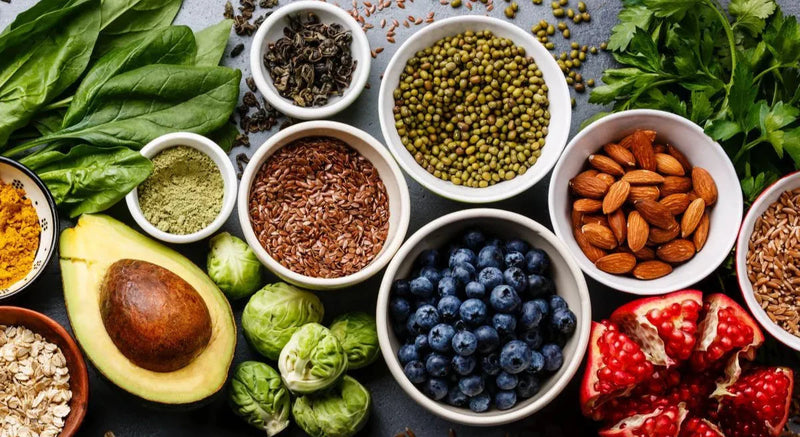Holistic Acne Support
In the first part of the acne blog we looked at the mechanisms that drive the progression of acne. In this second part I wanted to look at what steps we can take to address these mechanisms, restoring balance to the body and support healing of the skin.
Hormones and Inflammation
Reducing Insulin and IGF-1
~ follow a low Glycemic Load diet, this essentially means avoiding sugar, refined and simple carbohydrate
~ eat more plant protein and less animal protein (or organic meat)
~lots of fibre, slows release of IGF-1
~ low/ moderate ‘good’ fats.
Up-regulate SHBG (decreased with high levels of insulin, see above)
~ increase phytoestrogens
natural plant oestrogen’s can have a balancing effect on our own natural hormones and they can up-regulate the production of SHBG. Linseed (milled), oats, lentils, mung beans, soybeans, tofu, tempeh, sesame seeds, are all good sources.
Reduce Inflammation
~ avoid excess oils, especially trans-fats, hydrogenated fats and oxidised, fats
~ avoid processed and refined carbohydrate
These both initiate a cascade of free radicals and inflammation.
Supporting Detoxification and Digestion
To support liver eat plenty of cruciferous vegetables- broccoli, cabbage, brussels, pak-choy, kale etc).
Eat quality protein, particularly plant protein.
Include plenty of vitamin C rich fruit and vegetables, including, peppers, broccoli, celery, citrus fruits and berries.
Drink at least 2 litres of water per day.
Fibre supports the movement of food through the digestive tract. It also provides food for the beneficial microflora, while sugar and refined carbohydrate provide food for the ‘bad’ bacteria.
Eating pro-biotic and prebiotic foods to support a diverse and healthy intestinal microbiome. Probiotic foods contain live bacteria to replenish our microbiota, pre-biotics are non-digestible foods that stimulate growth of the microbiota.
So in summary, what to eat
Follow a Low GI diet, reduce sugar and refined carbohydrates
Eat high fibre foods, (to slow release of insulin and support healthy microbiome) wholegrains, oats, vegetables, fruit (pears and berries), beans and pulses, nuts and seeds.
Include probiotic foods such as live natural yogurt, fermented vegetables and keffir, and prebiotic foods such as onions, garlic, leeks, asparagus, bananas, apples, oats, flaxseed
Eat quality protein, think about plant protein, tofu, soy, lentils, chickpeas, edamame beans, nuts, quinoa, organic grass fed meat and plenty of fish.
Whole-plant foods - wholegrains, brown rice, beans, nuts, seeds, fruit and lots of vegetables.
Avoid trans-fats, hydrogenated fats and oxidised fats. Cook with olive oil and coconut oil, use unrefined seed and nut oils sparingly for dressings etc.
Limit processed and ready made meals and include as much unprocessed and fresh foods as possible.
Topical Preparations
So we’ve looked at supporting acne from an internal perspective, what about externally. Since acne has an internal root cause, can topical products actually help acne? Absolutely the products we choose can support healing, helping the skin to find its natural balance and help alleviate symptoms.
Conventional treatments and products usually focus on astringent cleansers and products that dry the skin out. These disrupt our naturally occurring lipids, compromising the integrity of the skin barrier (also called the acid mantle) and our beneficial microbiome leaving vulnerable to pathogens, harmful bacteria, environmental elements and pollution.
In an attempt to try and protect and repair itself the skin will naturally produce more lipids to replace the lipids which have been removed, so the skin then becomes oilier! Acne skin is in a state of inflammation, it is stressed and vulnerable and rather than ‘attacking’ it with harsh products we want to nurture and care for it and guide it back to a state of balance.
It may sound strange or even a bit scary to apply oil to an already oily skin. An understandable and common response to help alleviate excess oil is avoidance of all oil on the skin. Often products aimed at oily, blemish-prone skin not only avoid oils but use ingredients to actively dry the skin of sebum and oil.
However, the oils produced by our skin are an essential component of the skin's natural barrier and immune function and they provide a home for a healthy and diverse microbiome. When we try to remove or suppress the natural oils of our protective lipid layer, we not only potentially create dry flaky patches, leaving the skin vulnerable to bacteria and infection, but we actually set off a chain of events in the skin whereby it produces more oil to compensate for what has been removed.
Skin that is sensitive, and prone to acne often has an underlying deficiency of linoleic acid. This omega 6 fatty acid is crucial for the healthy development and maintenance of the skins barrier function. Dryness, scaly patches and other skin problems are often a result of linolenic acid deficiency. By choosing oils including Chia, Raspberry, Rosehip and Seabuckthorn that have fatty acids in beneficial ratios to address underlying deficiencies, balance can be restored.
Astringent oils rich in tannins such as Rosehip, grapeseed and jojoba strengthen skin tissues and minimise pores while also offering anti-inflammatory and antibacterial properties.
Lusan Preparations for acne support
Purity Cleanser
A gentle cleanser that supports skin barrier function, yet effective enough to alleviate congestion and clear blemishes.
Wild Meadow Essence
With an array of organic botanicals to soothe, hydrate and nourish irritated, reactive, inflamed and acne skin conditions.
Clarity Serum
Balances excessive oiliness, refines the appearance of pores, reduces the appearance of blemishes and soothes redness and inflammation for a calm, beautiful complexion.
View The Mechanisms Behind Acne












